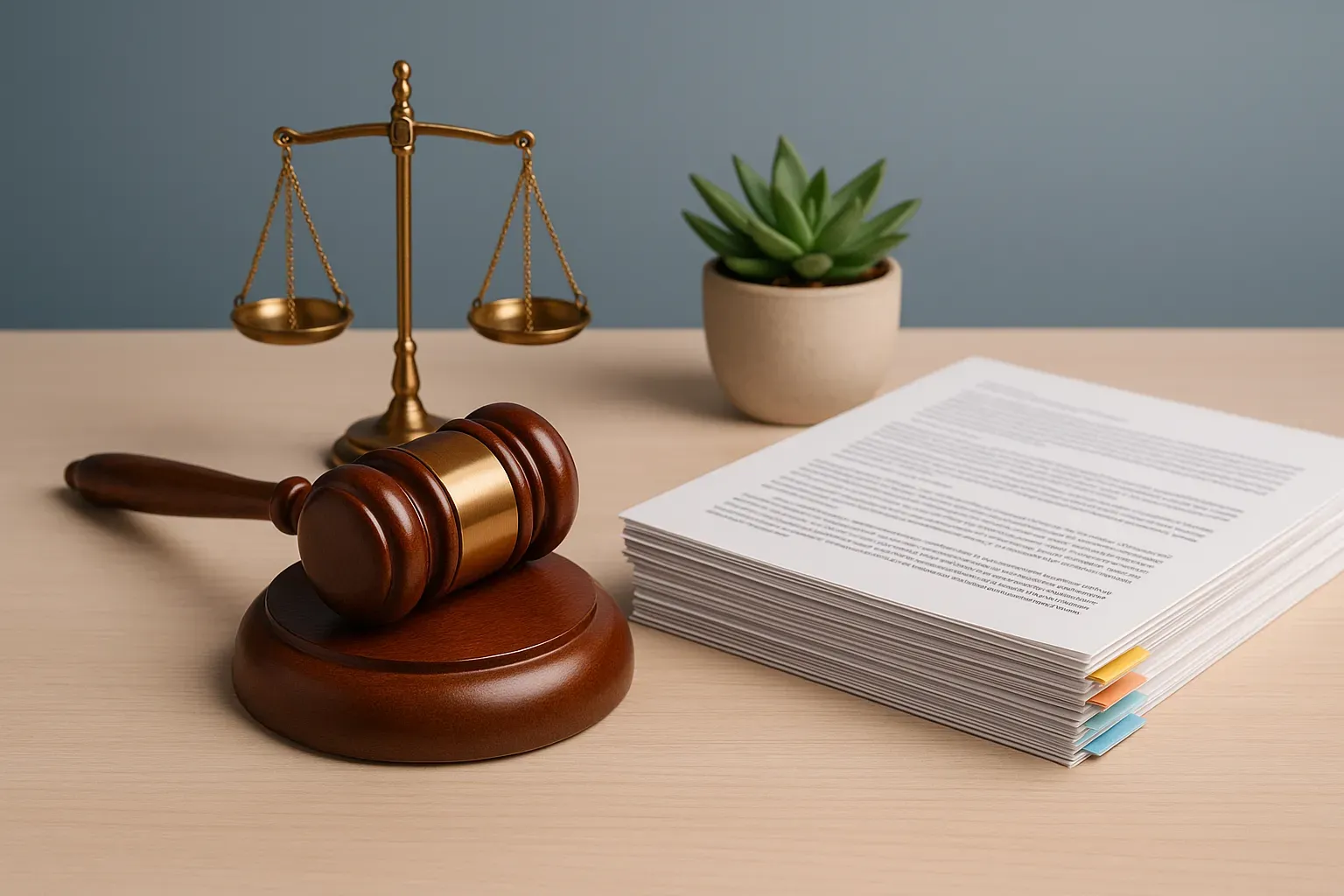This comprehensive guide to legal considerations for first-time entrepreneurs combines practical advice with expert insights across essential business areas. Legal professionals share targeted recommendations on everything from worker classification and shareholder agreements to data protection protocols and intellectual property rights. Entrepreneurs will find actionable strategies for establishing proper legal foundations that protect their ventures while supporting sustainable growth.
- Research Regulatory Requirements Before Product Launch
- Formalize All Agreements to Prevent Ownership Disputes
- Select Distinctive Business Names for Trademark Protection
- Understand Worker Classification to Avoid Costly Penalties
- Navigate Healthcare Advertising Compliance with Care
- Structure Shareholder Agreements for Future Success
- Embed Privacy Compliance into Product Design
- Set Legal Foundation Early with Expert Help
- Make Data Protection Foundational from Day One
- Invest in Proper Contracts for Labor Protection
- Choose Proper Legal Structure with Professional Help
- Review Dispute Resolution Clauses in All Contracts
- Address Extended Producer Responsibility for Physical Products
- Consult Regulators Early About Compliance Requirements
- Formalize Ownership Structure and Decision Rights First
- Document Everything and Consult Legal Professionals
- Establish Clear Tax Structures from the Start
- Secure Intellectual Property Rights from Day One
Research Regulatory Requirements Before Product Launch
Having built companies across biotech, finance, and tech for 20+ years, the biggest legal trap I see entrepreneurs fall into is regulatory compliance timing — specifically waiting until you’re ready to launch before understanding what approvals you actually need.
When we started my company in 2020, I assumed our UVC disinfection technology would fall under simple product safety regulations. Wrong. Because GermPass makes medical claims about killing pathogens in healthcare settings, we needed FDA guidance, lab certifications, and state health department approvals that took 18 months longer than expected. We burned through $200K in bridge funding just waiting for regulatory clarity.
The killer part? We could have started these processes in our garage phase for under $5K in consulting fees. Instead, we had to halt manufacturing and delay our Harvard Club launch by 8 months because we didn’t know Massachusetts required separate medical device notifications for hospital installations.
Start your regulatory research the day you write your first business plan, not when you’re ready to sell. In healthcare tech especially, compliance timelines will make or break your cash flow projections.

Formalize All Agreements to Prevent Ownership Disputes
Most first-time entrepreneurs think the biggest legal risk is signing the wrong contract. In reality, it’s the contracts you never sign.
I once saw a founder hire a friend as a “temporary” designer — no contract, just a handshake. Fast forward: the app takes off, investors are at the table… and the designer suddenly claims ownership of the entire visual identity. Lawyers were brought in, deadlines slipped, and the deal nearly collapsed. All because no one bothered with a two-page agreement at the start.
When I launched my own company, I promised myself: no handshake deals, even with friends. Sometimes it felt awkward to slide a piece of paper across the table to people I trusted — but that awkwardness was nothing compared to the chaos I’d seen elsewhere.
Paper is cheaper than lawsuits. If you don’t fix roles, rights, and responsibilities early, someone else will — in court.

Select Distinctive Business Names for Trademark Protection
The biggest legal trap I see first-time entrepreneurs fall into is choosing generic business names without considering trademark implications. The Supreme Court case I followed closely — USPTO vs. Booking.com — perfectly illustrates why this matters.
Most entrepreneurs think slapping “.com” or “LLC” onto a generic term like “booking” or “marketing” creates a protectable brand. It doesn’t. When we were building our firm, I watched countless small businesses get cease-and-desist letters because they picked names like “Houston Legal Services” or “Texas Car Repair” — completely generic terms that offered zero trademark protection.
My practical advice: before you file any paperwork, spend $500 on a trademark search through an IP attorney. I’ve seen businesses spend $50,000 rebranding after getting sued by competitors with similar names. One of our clients had to completely rebrand their successful auto shop because they chose “Quick Fix Auto” — turns out another company had been using a similar name for years.
The key is picking something distinctive early, not generic. Your business name should be protectable as intellectual property, not just available as a domain name.

Understand Worker Classification to Avoid Costly Penalties
One important legal aspect first-time entrepreneurs often overlook is worker classification — understanding the difference between employees and independent contractors. Misclassification can lead to costly penalties, back taxes, and even lawsuits. Early in my business, I hired support as independent contractors, but I made sure to review IRS guidelines, consult with an employment attorney, and set clear agreements that aligned with contractor status. I also built processes for regular reviews so that if roles shifted into more employee-like arrangements, I could adjust accordingly. My advice to others is to never assume classification is a minor detail; it has financial and legal implications that can make or break a young business. Take time to understand the rules in your state, document everything, and when in doubt, seek professional guidance before making decisions.

Navigate Healthcare Advertising Compliance with Care
After running my business for several years, the biggest regulatory surprise was healthcare advertising compliance — specifically the FTC and state board rules around health claims. Most entrepreneurs think about business licenses but miss the strict guidelines around what you can and cannot say about treatment outcomes.
I learned this when we launched our first marketing campaign. The Oklahoma Board of Chiropractic Examiners has very specific rules about testimonials, success rate claims, and even how you can describe treatments like the Webster Technique. We had to completely rewrite our website copy and social media content after receiving a warning letter about “misleading health benefit statements.”
Now we run every piece of marketing through a compliance checklist before publishing. We spend about $2,400 annually on legal review for major campaigns, but it’s saved us from potential board sanctions that could suspend our license. I’ve seen three local practices get hit with fines ranging from $5,000-$15,000 for violations.
My specific advice: before any health-related business launches marketing, get your state licensing board’s advertising guidelines and have a healthcare attorney review your website copy. The rules are very different from general business advertising and violations can literally shut down your practice.

Structure Shareholder Agreements for Future Success
One of the first legal aspects I always highlight to new entrepreneurs is the importance of structuring shareholder agreements properly. When I launched Spectup, I underestimated how critical it would be to have clear terms in writing from day one. At the time it felt almost unnecessary, because the team was small, the trust was high, and everyone was motivated by the same mission. But as soon as revenue started to grow and external partners came into play, those informal understandings quickly became fragile. I remember one case where a client of ours had skipped this step, and when an investor came on board, the lack of clarity between founders almost derailed the deal.
To avoid falling into that trap myself, I worked with a legal advisor early on to draft agreements that covered ownership, roles, decision rights, and what would happen if someone wanted to exit. It was not glamorous work, but it gave us stability. Over time, I realized that investors also look at these documents as a sign of maturity. A startup that has messy or unclear structures signals risk, while one with proper governance inspires confidence.
My advice to first-time entrepreneurs is simple. Do not wait until you are fundraising or facing conflict to handle legal basics. Get your agreements, intellectual property rights, and compliance requirements in place as soon as possible. Even if the company feels small, the effort you put into clean structures pays off later when the stakes are higher. Also, do not assume you can just download templates and move on. Every business has nuances, so it is worth investing in proper guidance. Legal considerations may not bring in revenue today, but they save you from disputes tomorrow and create the foundation that serious investors expect.

Embed Privacy Compliance into Product Design
One of the earliest legal traps I’ve seen first-time founders stumble into is data handling. The moment you start collecting emails, payments, or customer usage data, you’re inside the scope of privacy laws. In South Africa, that means POPIA (the Protection of Personal Information Act).
Even small startups are expected to handle consent properly, secure personal data, and prove compliance if audited. In our case, we embedded POPIA compliance into our product design by wiring customer sign-ups through Salesforce. This way, consent, opt-ins, and source-of-truth records were captured automatically, giving us an audit trail from day one.
P.S. If you’re reaching a global audience, be mindful of regional differences in data laws. POPIA is South Africa’s equivalent of GDPR, but it’s only about 80% similar. Both require lawful processing, consent, and data protection, except that GDPR covers more “sensitive” categories and stronger rights like erasure. And POPIA adds stricter cross-border rules and caps fines at R10 million (~$500k) versus GDPR’s 4% of global turnover.

Set Legal Foundation Early with Expert Help
One thing first-time founders often overlook is how quickly small legal missteps snowball, especially around entity setup and contracts. When I launched my first venture, I thought I could just “figure it out later.” Big mistake. Even something as simple as not having a clear operating agreement created headaches once money started moving and roles blurred.
The step that helped me most was finding a startup attorney early — not for every tiny decision, but to set the foundation. We registered the right entity for liability protection, clarified ownership percentages, and put contracts in place for contractors and partners. It wasn’t glamorous, and yes, it felt expensive at the time, but it saved me from costlier disputes down the road.
My advice: don’t copy-paste templates you found online and hope they hold up. Spend the time (and budget) to get the basics right: incorporation, IP ownership, and contracts. Once those are in place, you can focus on building without worrying that a missed clause will derail you later. It’s less about knowing every regulation yourself and more about surrounding yourself with the right expertise early.

Make Data Protection Foundational from Day One
One of the most important legal aspects first-time entrepreneurs often overlook is data protection and privacy, especially if you’re working in sectors like healthcare, finance, or anything involving user data. The moment you’re handling personal information, you’re responsible for complying with regulations like GDPR, HIPAA, or other local data protection laws depending on where your users are.
For us, getting this right wasn’t optional. We made privacy and compliance foundational from day one. That meant investing early in legal counsel, mapping out our data flows, and building systems that could meet multiple regulatory standards across different regions. We didn’t wait until we scaled to think about compliance. It was built into the product and infrastructure from the beginning.
My advice to other founders is simple. Start with a clear understanding of the laws that apply to your business, document everything, and build your systems with those requirements in mind. It will save you time, money, and major stress later on. If you’re handling data, especially sensitive data, you need to treat that responsibility seriously from day one.

Invest in Proper Contracts for Labor Protection
One important legal aspect I wish more first-time entrepreneurs paid attention to is contracts and compliance around labor laws. When you’re starting out, it’s tempting to rely on handshake deals or generic templates, but that can expose you to big risks — especially if you work with contractors or overseas teams.
In our case, we invested early in proper contracts that clearly outlined scope of work, payment terms, and intellectual property rights. We also consulted with a lawyer to make sure we were compliant with local and international labor regulations. That upfront cost saved us from messy disputes later on.
My piece of advice: don’t see legal as a burden — see it as insurance. Spend the time to set things up correctly from day one, even if it feels tedious. It gives you peace of mind and frees you to focus on growing the business, not cleaning up preventable problems.

Choose Proper Legal Structure with Professional Help
One of the biggest things we learned early on is to choose the proper legal structure for your business. Whether you’re an LLC, S-Corp, or sole proprietorship, that decision affects everything from taxes to personal liability. As first-time entrepreneurs, we felt overwhelmed, so we made sure to consult with both an attorney and an accountant before we filed anything. They helped us figure out what fit our goals and gave us peace of mind knowing we were starting right. Once the business was formed, we also ensured that we registered for the necessary licenses and permits and established a straightforward system to stay on top of renewals. It’s not fun work, but ignoring compliance can come back to haunt you. My advice to others is not to put this off or try to wing it. Even if budgets are tight, invest in at least one quality consultation with a professional who is knowledgeable about your industry. It will save you stress and potential legal headaches in the future. And once you’re set up, keep your documents organized — think of it as building a strong foundation so you can focus on growing your business with confidence.

Review Dispute Resolution Clauses in All Contracts
I think it is important to pay attention to dispute resolution clauses in contracts you enter. Many new businesses are so excited to be in business and have their first big contract that they don’t pay attention to what it says about what happens if there is a dispute. If you are dealing with a much larger entity, you may not want to have the only dispute resolution be AAA Arbitration where the average cost for a commercial dispute often exceeds $100,000 just in AAA forum fees (never mind the lawyer’s fees each side will incur). Similarly, if you are based in Wisconsin, you may not want to have to go to Georgia if there is a dispute. You will not always be able to change those provisions (depending on bargaining power for the deal) but you should at least be aware of what the agreement says, where disputes have to be venued, if there is a fee shifting provision requiring the losing party to pay attorneys’ fees, so you have an understanding of what a dispute might cost and it will allow you to better decide what is an acceptable business solution if a dispute begins. As a litigator, we are often brought in after the dispute has arisen, and we find many entrepreneurs are learning for the first time what they agreed to as the dispute resolution process at that time.

Address Extended Producer Responsibility for Physical Products
One of the first legal hurdles new founders underestimate is Extended Producer Responsibility (EPR). The rule of thumb is simple: if you sell a physical product, you are responsible for what happens to it at the end of its life. That includes packaging, electronics, textiles, and even batteries.
Failing to comply can lead to fines, blocked sales on platforms like Amazon, or reputational damage. Even very small sellers are usually covered, so “I’m too small to matter” isn’t a safe assumption.
How to handle it:
Check which categories apply to your product.
Register with the relevant authority or Producer Responsibility Organization.
Get an EPR number, marketplaces increasingly demand it.
Track and report how much packaging and product you put on the market.
Budget for eco-fees, which are often based on weight and recyclability.
Take EPR seriously early on, it’s much harder to retrofit compliance later. Keep good records of your packaging weights. If reporting feels overwhelming, use compliance partners. And think sustainably, lighter or more recyclable packaging doesn’t just help the planet, it can lower your fees too.
The bottom line is if you’re shipping physical products, EPR compliance isn’t optional, it’s part of your launch checklist.

Consult Regulators Early About Compliance Requirements
The process of understanding Colorado’s public bathing facility regulations proved to be a major legal challenge during my initial business development. The spa needed to demonstrate its private soaking rooms did not operate as a public swimming pool under Colorado regulations. I invested multiple weeks in discussions with regulators to obtain physical plan approvals and brought in a consultant who ensured our water treatment system and all signs met regulatory requirements.
My advice? Don’t guess. Determine which government departments will license your business since health and zoning departments may have different responsibilities, then initiate their review process right away. The purpose of regulations is to protect businesses through established boundaries. Your concept should follow existing regulations instead of requiring costly changes after construction completion.

Formalize Ownership Structure and Decision Rights First
After building five companies, one legal area I always pay close attention to is ownership structure and decision rights.
The way you set that up in the beginning doesn’t just determine equity splits, as it also dictates how the company makes decisions, how conflicts are resolved, and how resilient the business will be under stress.
In my observation, early stage founders often underestimate how quickly misaligned expectations can erode trust, and once growth accelerates, the absence of clear agreements tends to surface at the worst possible time.
I’ve seen founders rely on handshakes or verbal understandings mostly with their friends and relatives because it feels efficient, but when priorities shift or someone wants to exit or manage more, those informal deals collapse under pressure.
Having formal agreements like operating agreements, shareholder documents, and buy-sell clauses forces hard but necessary conversations while all involved are still aligned and before emotions run high. It creates a framework everyone can refer back to, which is invaluable when the business is moving fast and the stakes are higher than when you started.
For first-time entrepreneurs, my strongest advice is to invest in legal clarity right away, even if the company is small and the team is close-knit. Work with an attorney who understands startups and can translate your vision into documents that cover equity, roles, capital contributions, and exit paths.
You will never regret putting that foundation in place.

Document Everything and Consult Legal Professionals
When I started my first business, I quickly learned that choosing the right business structure was the most critical legal decision I had to make.
An LLC provided me with personal liability protection while keeping tax filing relatively simple, and I believe this is something every first-time entrepreneur should carefully consider before doing anything else.
My first step was registering my business with the state and obtaining an EIN from the IRS. I then researched every license and permit required for my industry, which took more time than expected but saved me from costly penalties later.
I made the mistake of trying to handle everything myself initially, thinking I could save money. However, consulting with a business attorney for just two hours gave me insights that probably saved me thousands in potential legal issues down the road.
For tax compliance, I set up quarterly estimated tax payments from day one. I also opened a separate business bank account immediately to keep personal and business finances completely separate, which made accounting and tax filing much cleaner.
When I hired my first employee, I underestimated the complexity of employment law. I had to quickly learn about workers’ compensation insurance, payroll taxes, and creating an employee handbook that covered essential policies.
My strongest advice is to document everything from the beginning. Every contract, email agreement, and business decision should be recorded because you never know when you’ll need that paper trail.
I also recommend joining a local entrepreneur group or online community. Other business owners freely shared their experiences with legal challenges, and their warnings helped me avoid several pitfalls.
The legal landscape changes constantly, so I set aside time each quarter to review new regulations. What seemed compliant last year might not be today, especially with data privacy and online business regulations evolving rapidly.

Establish Clear Tax Structures from the Start
One key aspect that founders should keep in mind is tax compliance. Many underestimate how quickly formal errors can have legal consequences. When I was starting my own business, I made a conscious effort to establish clear structures in financial accounting and introduce clean processes from the outset. My advice to others: seek professional support early on, document everything consistently, and don’t rely solely on “well-meaning” advice. If you do your taxes properly from the outset, you will not only save yourself problems later on, but also create a solid foundation for sustainable growth.

Secure Intellectual Property Rights from Day One
The single most important legal thing I’d tell a first-time founder is to lock down intellectual property from day one, especially when contractors and collaborators are involved. The thing is that if you don’t paper it, you don’t own it.
Let me share one raw truth from my experience:
Early on we hired a videographer for a mini-course and assumed “we paid, so it’s ours.” The contract only granted a narrow use license. Months later we tried to cut ads and a workbook from that footage and hit a wall — new fees, delays, awkward calls. It pushed a launch back and cost more than a lawyer would’ve.
What we did next: paid a startup attorney to build a plain-English MSA/SOW we use with everyone. It includes work-made-for-hire + full IP assignment upon payment, delivery of raw files, portfolio-only license back to the contractor, model/voice releases, proof of third-party licenses (music, stock), and a moral-rights waiver where applicable. We tied the final payment to the receipt of rights, and we keep a simple “rights log” (who made what, when, where we can use it). For co-created programs, we signed contributor agreements that separate brand/trademark ownership (ours) from course content and revenue share (joint), plus a clean kill switch if either party exits.
Advice I’d give anyone: spend a little once to get good templates; never start work without a signed SOW; collect raw assets; separate brand/trademarks from product names; and keep all signed docs in one folder you can find under pressure.


